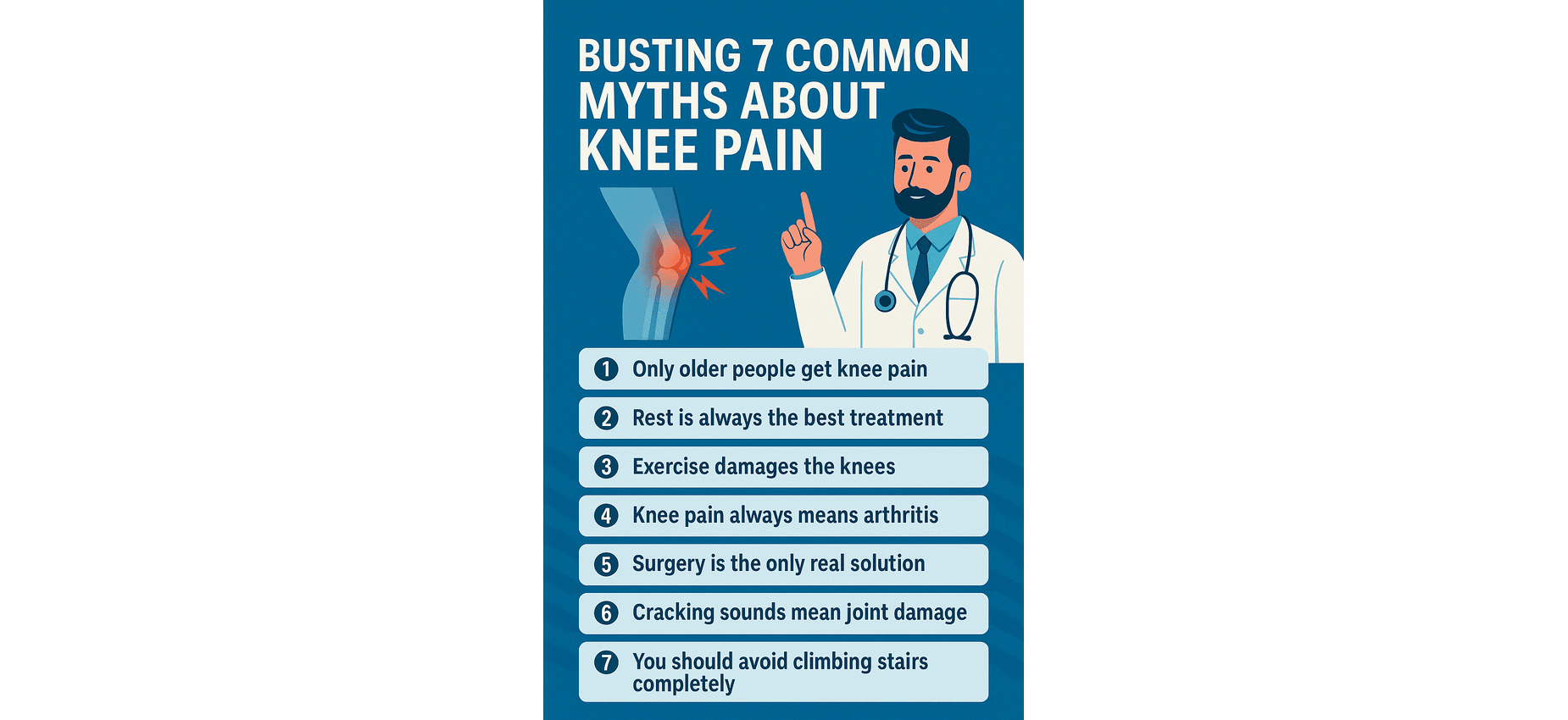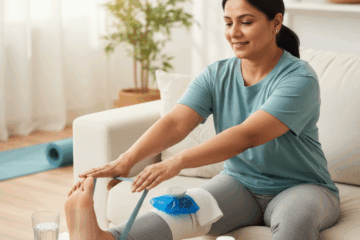Knee pain is a common issue that affects millions of people, especially those over 40. Despite its prevalence, there are countless myths surrounding what causes knee pain and how to treat it. Misinformation can delay proper care and sometimes make the condition worse. That’s why we’ve collaborated with a senior orthopedic specialist with over 18 years of experience to bring you the truth.
In this blog, we debunk 7 widespread myths about knee pain and reveal the facts that can help you protect your joint health and live pain-free.
❌ Myth #1: Only Older People Get Knee Pain
Truth: While aging does increase the risk of joint degeneration, knee pain isn’t exclusive to older adults. People of all ages, including teenagers and young adults, can experience knee pain due to factors like sports injuries, poor posture, obesity, and sedentary lifestyle.
Doctor’s Insight: “I see patients in their 20s and 30s regularly for knee pain—mostly due to muscle imbalances, early arthritis, or poor workout form.”
Takeaway: Don’t ignore early signs just because you’re young. Early care leads to better outcomes.
❌ Myth #2: Rest Is Always the Best Treatment
Truth: While short-term rest can be helpful during acute injury, prolonged inactivity can weaken muscles and worsen joint stability. Controlled movement is essential for recovery.
Suggested Activities: Try low-impact exercises like walking, cycling, yoga, and swimming. Always consult a doctor or physiotherapist for personalized advice.
Doctor’s Note: “Movement is medicine. Unless you’ve had surgery or a severe injury, inactivity often delays healing.”
❌ Myth #3: Exercise Damages the Knees
Truth: When done correctly, exercise strengthens the muscles around the knees, improving joint support and reducing pain.
Avoid: High-impact exercises like jumping, running on hard surfaces, or heavy squats without guidance.
Focus On: Low-impact activities, resistance training with supervision, and flexibility routines.
Doctor’s Note: “It’s not exercise that causes damage—it’s poor form and overuse.”
❌ Myth #4: Knee Pain Always Means Arthritis
Truth: Knee pain can stem from multiple issues—not just arthritis. It could be bursitis, tendinitis, ligament tears, cartilage wear, or even posture-related strain.
What to Do: Always get a clinical evaluation and imaging, if needed. Self-diagnosing can lead to incorrect treatment.
Doctor’s Insight: “Even mild vitamin D deficiency or foot alignment problems can lead to knee pain.”
❌ Myth #5: Surgery Is the Only Real Solution
Truth: Surgery is a last resort. Most patients benefit from weight management, physiotherapy, dietary improvements, and posture correction before considering surgery.
Conservative Treatments:
- Physiotherapy
- Knee braces
- Supplements (like collagen, calcium, Vitamin D)
- Anti-inflammatory diets
Doctor’s Note: “Over 70% of my patients avoid surgery through lifestyle changes.”
👉 Related Read: How Losing 5kg Can Save Your Knees – Here’s the Science
❌ Myth #6: Cracking Sounds Mean Joint Damage
Truth: Hearing a popping or cracking noise in your knee isn’t always a sign of damage. If it’s painless and infrequent, it’s usually harmless and due to air bubbles or minor movement of ligaments.
When to Worry: If cracking is accompanied by pain, swelling, or instability, consult a doctor.
Doctor’s Insight: “Not all sounds are dangerous. Pain is your body’s red flag—not sound.”
❌ Myth #7: You Should Avoid Climbing Stairs Completely
✔️ Truth: While stairs can be painful, avoiding them entirely can lead to muscle atrophy and worsened knee stability.
🧍♀️ Safe Approach: Use handrails, take breaks, and climb slowly. Strengthen thigh and hip muscles to support stair climbing.
Doctor’s Note: “Avoiding stairs can make knees weaker. Learning how to use them safely is a better strategy.”
Conclusion: Know the Facts, Save Your Knees
Falling for common myths about knee pain can delay recovery and worsen your condition. By staying informed and taking the right steps, you can avoid unnecessary pain, prevent injury, and improve your quality of life.
📣 Takeaway: Don’t wait for surgery or severe damage. Start with small changes today.
👨⚕️ Expert Tip: Always consult a certified orthopedic or physiotherapist for accurate diagnosis and treatment.
Don’t Forget to Read These:
👉 What to Eat and Avoid If You Have Knee Pain – Doctor’s Diet Plan
A complete food guide from a doctor to reduce inflammation and support joint health.
👉 Best Morning Stretches to Keep Your Knees Healthy After 40
Discover simple morning movements that can strengthen your knees and improve flexibility.
👉 Why Your Sitting Posture Is Destroying Your Knees (And How to Fix It)
Understand how poor posture silently damages your knees and how to correct it.




